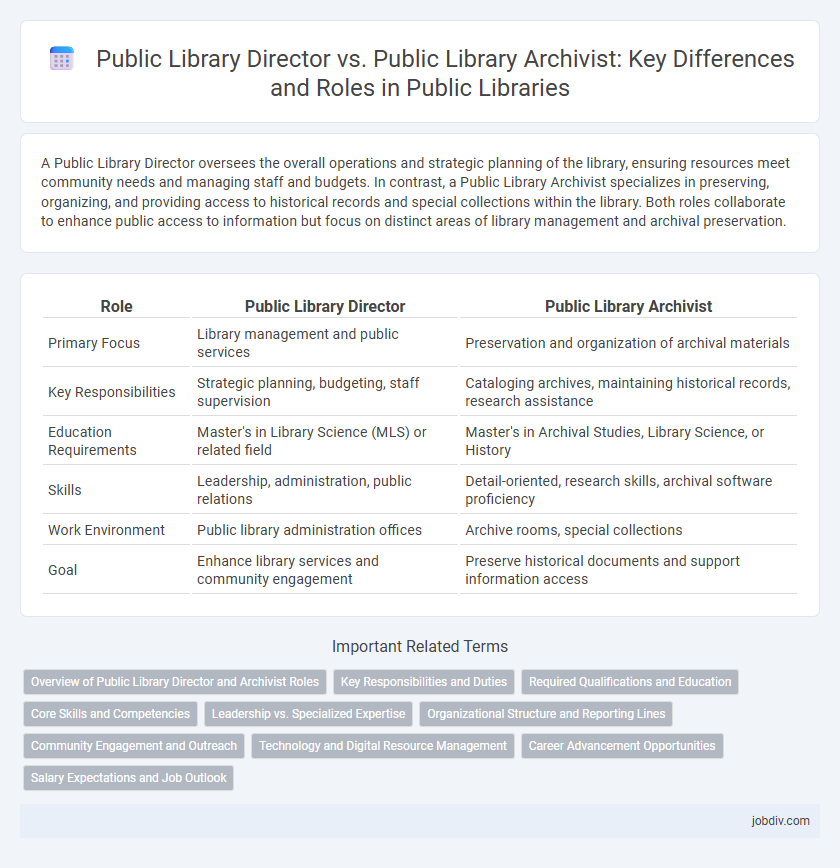A Public Library Director oversees the overall operations and strategic planning of the library, ensuring resources meet community needs and managing staff and budgets. In contrast, a Public Library Archivist specializes in preserving, organizing, and providing access to historical records and special collections within the library. Both roles collaborate to enhance public access to information but focus on distinct areas of library management and archival preservation.
Table of Comparison
| Role | Public Library Director | Public Library Archivist |
|---|---|---|
| Primary Focus | Library management and public services | Preservation and organization of archival materials |
| Key Responsibilities | Strategic planning, budgeting, staff supervision | Cataloging archives, maintaining historical records, research assistance |
| Education Requirements | Master's in Library Science (MLS) or related field | Master's in Archival Studies, Library Science, or History |
| Skills | Leadership, administration, public relations | Detail-oriented, research skills, archival software proficiency |
| Work Environment | Public library administration offices | Archive rooms, special collections |
| Goal | Enhance library services and community engagement | Preserve historical documents and support information access |
Overview of Public Library Director and Archivist Roles
Public Library Directors oversee the strategic management, budgeting, and community outreach of library services, ensuring alignment with local government policies and public needs. Public Library Archivists specialize in preserving, organizing, and providing access to historical records, rare collections, and local heritage materials within the library system. Both roles require strong organizational skills and a commitment to advancing public knowledge, but Directors focus on operational leadership while Archivists emphasize collection stewardship.
Key Responsibilities and Duties
A Public Library Director oversees strategic planning, budgeting, and community outreach to ensure library services meet public needs effectively. In contrast, a Public Library Archivist manages the acquisition, preservation, and organization of historical documents and special collections, maintaining accessibility for research and educational purposes. Both roles require collaboration with staff and stakeholders but differ in their focus on operational leadership versus archival stewardship.
Required Qualifications and Education
Public Library Directors typically require a Master's degree in Library Science (MLS) or Library and Information Science (MLIS) from an ALA-accredited institution, along with significant experience in library management and administration. Public Library Archivists usually hold a Master's degree in Archival Studies, History, or Library Science with specialized archival training, emphasizing skills in preservation, cataloging, and digital asset management. Both roles demand strong organizational, communication, and leadership abilities, but Directors focus more on strategic planning and budgeting, while Archivists prioritize collection care and historical research.
Core Skills and Competencies
Public Library Directors excel in leadership, strategic planning, and budget management, overseeing library operations and community outreach to enhance public services. Public Library Archivists specialize in records management, preservation techniques, and archival research, ensuring the organization and accessibility of historical documents and collections. Both roles require strong communication skills and knowledge of information technology, but Directors emphasize administrative expertise while Archivists focus on detailed curation and historical accuracy.
Leadership vs. Specialized Expertise
Public Library Directors exhibit strong leadership skills by managing library operations, budgets, and community programs to ensure effective service delivery. In contrast, Public Library Archivists provide specialized expertise in preserving, organizing, and curating historical documents and rare collections. While directors focus on strategic planning and stakeholder engagement, archivists concentrate on maintaining the integrity and accessibility of archival materials.
Organizational Structure and Reporting Lines
The Public Library Director oversees the entire library system, managing budget allocation, strategic planning, and community outreach while reporting directly to the governing board or municipal authority. The Public Library Archivist specializes in preserving historical records and rare collections, typically reporting to the Director or a Collections Manager within the organizational structure. This hierarchy ensures clear communication channels, with the Director responsible for overarching library operations and the Archivist focused on archival integrity and access within that framework.
Community Engagement and Outreach
Public Library Directors oversee strategic initiatives that amplify community engagement by developing inclusive programs and fostering partnerships with local organizations. Public Library Archivists focus on preserving historical records and curating exhibits that connect community heritage with public interest, enhancing outreach through educational workshops and digital access. Both roles collaboratively strengthen community connections by promoting library resources tailored to diverse populations.
Technology and Digital Resource Management
Public Library Directors oversee strategic planning and implementation of technology infrastructure, ensuring seamless integration of digital platforms for community engagement and resource accessibility. Public Library Archivists specialize in managing digital archives, employing advanced metadata standards and preservation technologies to maintain digital collections' integrity and accessibility over time. Both roles require proficiency in digital resource management software, but Directors focus on broad technology policies, while Archivists concentrate on digital preservation and archival systems.
Career Advancement Opportunities
Public Library Directors oversee operations, develop strategic plans, and manage budgets, offering extensive leadership experience crucial for higher administrative roles. In contrast, Public Library Archivists specialize in preserving historical records and managing collections, providing expertise valuable for advanced archival or curatorial positions. Career advancement for directors often leads to executive-level roles within library systems, while archivists typically progress into specialized archival management or academic research roles.
Salary Expectations and Job Outlook
Public Library Directors typically earn a median salary of $75,000 to $110,000 annually, reflecting their responsibilities in managing library operations and staff, while Public Library Archivists have a median salary ranging from $50,000 to $70,000, focusing on preserving and organizing historical records. The job outlook for Library Directors shows steady growth at approximately 5% over the next decade due to continued investment in public education and community services. Archivists face a slightly faster projected growth rate of around 8%, driven by increased digitization efforts and demand for historical data management.
Public Library Director vs Public Library Archivist Infographic

 jobdiv.com
jobdiv.com